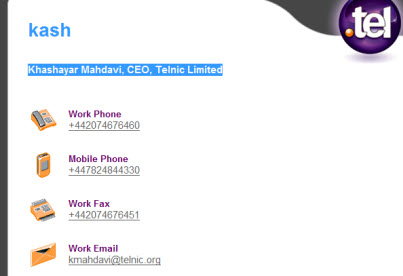Telnic, .tel domains & the small business namespace
Alex Bellinger considers the fear behind domain name bloat, the catch-22 of .tel for small businesses and the battle for the definitive ‘namespace’ online.
I don’t know about you, but every time a new top level domain (the bit after the dot in your web address also known as a TLD) is released, I feel like someone’s pointing a gun at my head.
Just when you thought you’d secured your brand, small business or startup presence online by buying up the .com and .co.uk versions of your domain name, all of sudden someone comes up with .biz, .tv, .mobi, .net or the latest, .tel.
It’s as if the companies behind TLD bloat are saying: buy this new domain now before some squatter or adsense splogger grabs it and trashes your brand, your trademark or your business online.
And that’s exactly what seems to drive demand and create a ‘new gold rush’ in the domain name market – fear.
Add to this the confusion which liberalisation of domain names in 2010 is bound to cause and protecting your business ‘name’ on the internet or mobile all begins to look very messy, not to say expensive.
Telnic and .tel – more of the same?
So when I received a call from someone representing Telnic, the company behind .tel domains, extolling their benefits to small businesses, I was more than a little sceptical.
Interestingly though .tel isn’t just another domain name – Telnic really has innovated.
A .tel domain, which will cost you around £12 a year, allows you to put your business or personal contact details encrypted on servers at the heart of the internet known as the DNS (domain name servers) and make them visible online and accessible quickly and easily on smart phones. So what are the benefits?

A .tel page which allows you to keep your contact details online in a simple .tel template held on domain name servers.
Telnic claims this helps non-tech savvy small businesses get a presence online, assists in SEO (search engine optimisation) through easily updateable keywords and thereby discoverability, creates a distributed global business directory and is very fast, particularly on mobile platforms.
Most of these benefits are highly debatable when it comes to what SMEs want.
Small business benefits of .tel?
Let’s consider web presence, SEO and discoverability. The simple html and javascript template (see above) which creates the .tel web presence is certainly a one-stop-shop for your business contact details and a few keywords, but it’s not much more.
Although friendly to search engine spiders because it’s so simple, the page is very unlikely to appear high in search results other than for your name or the name of your business. And surely you’d want your own website in that position?
Most small businesses online want to be discovered ahead of their competition locally or nationally for more general searches e.g. ‘glasgow plumber’ perhaps.
Making it easy for people who already know your business to find your contact details is fine, but it’s hardly discoverability or a source of new punters.
The keyword ‘benefits’ are also largely irrelevant because search engines look for fresh, relevant content and reputation in terms of in-bound links, something these pages are unlikely to attract.
As for speed, well such simple web pages load rapidly – in less than a second – but the benefit is hardly perceptible compared to well-designed ordinary websites.
If .tel, and it’s a big if, becomes the equivalent of a global business directory online, your business will be competing against thousands of others in the same category.
And because of the lack of information on the .tel pages, it’s going to offer no perceivable benefit in terms of differentiation. No more certainly than you’d get from being listed for free in a directory like Yell.com or FreeIndex.co.uk.
Bye, bye address book?
But in a couple of areas Telnic may be on to something, although they face a catch-22 as do their potential customers.
Browsing the web on mobile phones has seen massive growth as smartphones proliferate. Telnic’s .tel domains make your contact details easily accessible and also dialable on the move.
But then Facebook, Gmail contacts, and Plaxo do this too and Apple’s iPhone allows you to dial numbers on websites by clicking on them straight on the phone’s mobile browser.
What differentiates .tel is the possibility of synchronising contact details as they’re updated by your contact, not you. Always having up-to-date details for business contacts that you no longer have to update yourself is a big potential plus.
I’m a name, not a number
The catch-22 is that this service only becomes really useful, if .tel becomes ubiquitous and you and all your business contacts are using it.
But ubiquity is tough. To that extent .tel is competing against free services like Twitter and Facebook to become a definitive ‘namespace’ for people and businesses.
What’s a namespace? Well rather than everybody having a telephone number, it’s everybody having a universally accepted digital ‘name/home’. An easy to remember ‘handle’ that every man, woman and child recognises. One click and you’re in touch, online or on the move.
Twitter with its @ symbol and Facebook profiles have come the closest to achieving this so far. Both companies have millions and millions of people on their platforms, with ambitions to grow to 1 billion users.
Your hairdresser knows about Twitter and Facebook. Your hairdresser probably uses Twitter and Facebook. The day your hairdresser asks you, ‘what’s your .tel’ will be the day Telnic is dreaming of.
As the company’s head of communications, Justin Hayward, said to me last week:
We’re certainly aiming for our Hoover moment.
The moment when .tel becomes a generic term, a verb or a universally accepted ‘namespace’.
It may be a long wait.
Leave a comment
Share & Comment
Related Posts
SME News
- Entrepreneurs 2012 with President Bill Clinton 13-16 November
- IDCEE 2012. Internet Technologies and Innovations
- Nurturing the next generation of social entrepreneurs
- Get Britain Trading needs you
- Manufacturing gains, but economy fragile
- Minister to answer webcast questions on apprenticeships
- Staff beat £230 million a day cost of big freeze
 SME Blog
SME Blog
 3 comments
3 comments












Great post.
The .tel concept can also be seen as an alternative to the many virtual business card services out there. The main disadvantage of .tel being that annual subscription. The .tel interface also currently doesn’t support direct social media profiles (you have to list the URL instead of just your ‘handle’).
I purchased a .tel for my company earlier this year, though I think that Telnic have done a lousy job thus far in alerting the masses of .tel’s existence, let alone benefits.
Mr. Bellingers’ reservation is understandable, because .tel is a very new top level domain. One that modernizes our way of communication; it takes some imagination and time to see the added value of it.
.tel is a top level domain in progress and certainly has great potential. The claim that telsites are useless for one’s presence on the internet is false. Type the Dutch words ‘privekliniek’ (private clinic) and ‘Amsterdam’ (the Dutch capital) and you will find the privekliniek.tel on Google’s second page. Make combinations with ‘Breda’, ‘Maastricht’, and ‘Nederland’ (The Netherlands), and you will see the .tel site on the second page too. If you type ‘privekliniek’ and ‘ooglidcorrectie’ (eyelid correction) you will even find privekliniek.tel on Google’s first page. So, it surely is possible for the Glasgow plummer to appear high in Google’s results.
.tel sites can have great advantages. First, it can make searching on the internet much more efficient. When giving it a few words Google doesn’t bother to present 42.000.000 hits, saying: ‘Lots of success with ‘m, have a nice day’. .tel sites allow you to categorize website links so that internet searchers can find relevant links easily, and not hidden on page 472 of Google. A geographical element can be introduced in searching, for instance when you choose glasgow.plummer, london.plummer, newyork.plummer, etc. When I’m correctly informed Telnic is to introduce a special search engine for .tel domains. Because telsites are standardized and can be developed with maps –europe, glasgow, news, sale, etc.– a search engine can be build on the basis of domain names, keywords, and map names. I’m very curious about what their search engine will be like.
Twitter and other social networks offer the possibility to connect, but it doesn’t work that quick, it doesn’t offer a nice overview with all contact data that can be consulted instantly, it doesn’t give much possibilities to make all kinds of quick links to web information and it isn’t suitable for those who are nót part of the network –I don’t think I will look for a plumber by consulting my networks or searching for a plumber network somewhere. Twitter, Facebook and all other social networks are costless, that’s true, but their disadvantage is that they don’t have much to offer either. Twitter is popular since the beginning of this year –note that 75% of all Twitter activity comes from only 5% of all users– but how long will this last? Big chance that next year or the year after other websites will be hot. Facebook is not that popular anymore among young people since their parents are participating too. And what about Second Life? Almost none of the social networks dispose of a healthy business model, so you never know whether they will survive or not. Telnic has a business model, fortunately, and asks participants to contribute 12 pounds a year. This is only a small amount, also considering the money one need to spend for a sponsored link at Google. With .tel you have your own domain, you can organize it in your own way, and wherever you are, whether at work, at home, on holidays, or now or in the future, you can always be found at [yourname].tel .
.tel is flexible, quick, easy to use, and it is by far not as expensive as building a representative website –a multiple of 12 pound. With .tel a company can guide their customers quickly to the most relevant or new parts of their website, whether these customers are connecting via a computer or a mobile device. They don’t need to rebuild their website each time they‘ve something new.
All in all, I’d say Telnic, in helping us connecting in the most easy way and in solving the 42.000.000 hits problem, deserves a lot more credit and our support. Yahoo, Heineken, and others recently started judicial procedures to get ‘their’ .tels. This is another indication that telsites are about to make a difference.
Edwin van Rooyen, .tel enthusiast
@Gee thanks for your comment. I leave it to others to judge how effective Telnic has been at promoting .tel.
@Edwin thanks too for taking the time to comment so fully.
If I need a plumber in my home town, I’d ask a friend. Recommendation is a powerful thing. If I couldn’t find a recommended plumber, then I might well resort to Google. And as you rightly point out, this is often not terribly helpful. How do you sift through the huge array of results?
But social networks broaden the possibility of online search. Twitter is a real time, human-powered search engine in many respects – a great recommendation engine. If I needed a plumber in Amsterdam, for example, I’m sure one or two of my Dutch friends on twitter could suggest someone in no time.
As for Heineken and Yahoo lawsuits to obtain their own .tel domains – this isn’t necessarily a sign of the value they see in the domains. It could easily be a necessary defensive move designed to prevent squatters abusing .tel with bogus telephone numbers or scams.
Perhaps I’m too paranoid about these things! Thanks again for your comment.